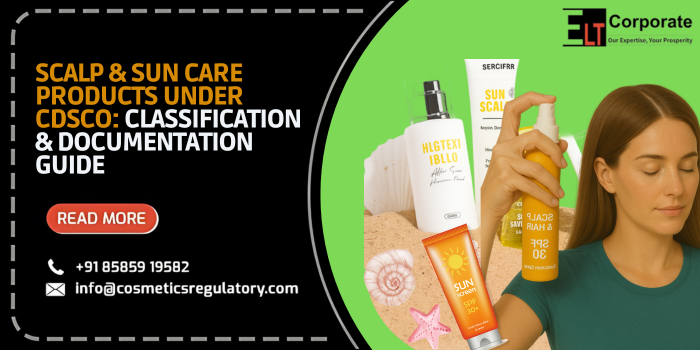Personal care and cosmetic markets in India have become required in scalp and sun care products. With increasing consumer awareness about skin protection and skull health, demand for safe and effective products is increasing. In India, cosmetics, including scalp care and sun care products, are regulated by the Central Drugs Standard Control Organisation (CDSCO) under the Drugs and Cosmetics Act, 1940 and Cosmetics Rules, 2020.
If you are a manufacturer, importer or distributor, it is mandatory to ensure compliance before placing such products in the market and getting CDSCO approval. This guide provides a step-by-step explanation of classification, documentation and regulatory requirements for scalp and sun care products under CDSCO.
What Are Scalp & Sun Care Products under CDSCO?
Scalp and sun care products are classified as cosmetics when they are intended for cleaning, beautifying, moisturising or safety without medical claims. Products that claim to consider conservative, fungal infection, or sunburn as “disease treatment” can be classified as drugs and require a separate licensing process.
Examples include:
- Scalp Care: Shampoo (cosmetic grade), scalp serum, scalp oil.
- Sun care: sunscreen, sunblock, sun-sun lotion, tanning cream.
Importance of CDSCO Approval for Scalp & Sun Care Products
- Consumer Protection: Ensures protection from harmful UV filters, toxic chemicals or scalp irritation.
- Legal compliance: Penalties, product recall and ban are avoided under Indian cosmetic laws.
- Market reliability: Consumer increases confidence and brand reputation.
- Export Capacity: CDSCO registration increases global acceptance of Indian-made products.
Classification of Scalp & Sun Care Products
Under CDSCO rules, products are classified:
- Aesthetics: Sunscreen, scalp oil, serum, spray and shampoo for beautification/safety.
- Drugs: “Treats psoriasis,” “fungal infection,” or products that make medical claims such as “medicated sunburn treatment”.
Correct classification is the first step before proceeding with registration.
Step-By-Step Process to Obtain CDSCO Approval
1. Product Classification – Cosmetic vs Drug
Determine the correct category. If the claim is cosmetic (protection, beautification), it follows the cosmetic approval route. If therapeutic, it goes under drug regulation.
2. Appointing an Authorised Indian Agent (for Imports)
Foreign manufacturers must authorise an Indian Representative through a Power of Attorney (POA) to interact with CDSCO and file on the SUGAM portal. (Unlike drugs/medical devices, a wholesale license is not required for cosmetics.)
3. Filing Application for Registration (Form COS-1)
Apply through the SUGAM Portal in Form COS-1. Each product and variant must be registered separately.
4. Compilation of Documents
Gather all supporting documents such as Free Sale Certificate, manufacturer’s license, ingredient safety data, labelling samples, IEC & GSTIN details, and POA.
5. Fee Payment via Bharatkosh
Pay applicable government fees online through the Bharatkosh portal. Attach proof of payment to the application.
6. Review & Issuance of Registration Certificate (Form COS-2)
CDSCO reviews the application and may raise queries. Once approved, a Registration Certificate (Form COS-2) is issued.
7. Import Enablement (COS-4/COS-4A, where applicable)
For imported products, after COS-2 is granted, the Import Registration Number/endorsement is issued via COS-4 or COS-4A as applicable. This enables legal importation and sale of the registered product.
8. Labelling Compliance under Indian Law
Labels must comply with Cosmetics Rules, 2020 (Chapter VI), along with any relevant BIS standards and Legal Metrology provisions. Key particulars include:
- Product Name
- Ingredients in descending order
- Manufacturer details
- Batch number, Mfg. & Exp. date
- Net content
- Safety warnings (e.g., “for external use only”)
9. Ongoing Compliance & Renewal
Maintain product safety data, batch testing reports, and customer complaint records. Registration and import endorsements must be renewed as per CDSCO timelines.
Documents Required for CDSCO Approval
- Form COS-1 (Application)
- Covering Letter
- Power of Attorney (POA)
- Free Sale Certificate (FSC)
- Cosmetic Manufacturer’s License
- IEC & GSTIN copies (for Indian entity)
- Ingredient List with % Composition
- Product Information Sheet
- Safety & Toxicology Reports
- Product Specifications & Test Reports
- Label & Artwork Samples
- Declaration of Non-Animal Testing (mandatory in India)
- Undertaking on BIS & Cosmetics Rules compliance (heavy metals/hexachlorophene limits)
- Product Sample (if required)
- Fee Payment Receipt
How ELT Corporate Can Help
At ELT Corporate, we specialise in regulatory approvals for cosmetics and personal care products. Our experts assist with classification, documentation, portal filing, and compliance with CDSCO regulations. From scalp serums to sunscreens, we ensure timely approvals and smooth market entry for your products.
Conclusion
Scalp and Sun care products are a growing category in India’s cosmetic market. To ensure safe, obedient and consumer-tradition products, it is necessary to obtain CDSCO approval. Following the correct classification, careful documentation, and labeling rules is the key to success. Whether you are a domestic manufacturer or an importer, professional regulatory guidance can save time, reduce the risk, and the competitive personal care can secure your product status in the market.
FAQs
Do all scalp and sun care products need CDSCO approval?
Yes, if classified as cosmetics and intended for sale in India.
What if my sunscreen claims to “treat sunburn”?
Such products may fall under the drug category, requiring a different approval pathway.
Are imported scalp & sun care products treated differently?
Yes, imported products require an Authorised Indian Agent, a Free Sale Certificate, and import registration endorsement in addition to product registration.
Which ingredients are checked by CDSCO in sunscreens?
UV filters, preservatives, and restricted substances are carefully evaluated for safety and compliance.



